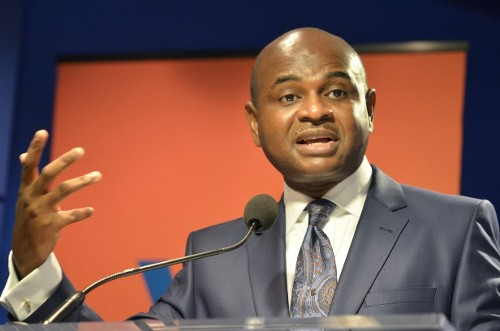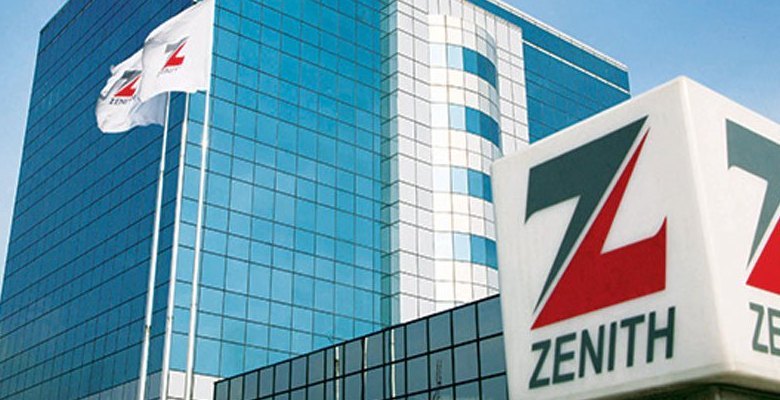Due to Nigeria’s slow economic growth rate, President, Institute for Governance and Economic Transformation (IGET), Prof Kingsley Moghalu, said the Africa’s largest economy has failed to achieve high quality growth because it is managed by ad hoc, reactive basis.
The IGET boss, who was a former Deputy Governor, Central Bank of Nigeria (CBN), made this disclosure at the 2018 Bullion Lecture of the Centre for financial Journalism, with the theme: “Overcoming Poverty: The Secret of the wealth of Nations.” In his speech at the occasion, Moghalu noted that it is a “survival” economy in which most governments that held power had real economy vision and a strategy to execute such a vision successfully.
According to the Presidential aspirant in the upcoming 2019 general election, “most damaging, there is little interrogation of either received wisdom based on global economic policy “fashions” or of the country’s own policy assumptions that have been long on populism and short on substance.
He, however, noted that to build a sustainable economic future, Nigeria must now address the aching need for a clean economic vision, situated in a philosophical framework from which economic policy should be derived. “Nigeria economic policy has not undertaken this kind of self-examination since General Ibrahim Babangida military government introduced the International Monetary Fund and World Bank inspired Structural Adjustment Programme (SAP) in 1986”, the former CBN Deputy Governor added. He pointed out that the wealth of nations always have philosophical foundations.
It is these fundamental understanding, how we understand and apply them, rather managing our economy with no particular lodes tar or compass that makes the difference between grab and stagnation, he stated. Prof. Moghalu stressed that the vision of things matters because it sets out a national ambition to transform the economic structure and the lives of citizens against the canvass of both the medium and long term and a clear destination.
He said, “The problem we have today is not that the economy was liberalised. The problem that continues to challenge our economy development path is that first liberalisation happened without the necessary foundations for prosperity in a liberal capitalist economy because we moved into financial liberalisation without achieving required threshold of industrialisation, which is what drives economic transformation.
“The point here is that Nigeria and many other developing nations in Africa are poor, unable as yet to obtain the benefits of broadband, inclusiveness economic growth from capitalist economic because they have yet to understand what makes capitalists economies successful.
The don further noted that Nigeria has gotten it wrong in a fundamental manner as far as its understanding of wealth and poverty of its citizens are concerned, adding that this is why 152 million Nigerians are very poor. “The relative absence of sound economic thinking among even our supposedly enlightened class of “Economists” who continue to believe that classic economic with its focus on economic growth statistics, instead of a focus on economic, organisations and development, will result in economic transformation”, he stated. Similarly, a philanthropist and founder of Microsoft Corporation, Mr. Bill Gates, had at the special and expanded National Economic Council, held in Abuja, recently, disclosed that the present economic template being used by the Muhammadu Buhari government does not have the ability to address the unique needs of Nigerians at present.
He noted that the Nigerian government’s Economic Recovery and Growth Plan (ERGP) identifies “investing in our people” as one of three “strategic objectives” but the “execution priorities” do not fully reflect people’s needs, “prioritising physical capital over human capital.”
Gates said the most important choice Nigerian leaders can make is “to maximise the country’s greatest resource, which is the people.” The investor also advised the Nigerian government to shift its attention from oil to the agricultural sector so as to make it a steady and alternative means of revenue generation for the country.
But the Federal Government has swiftly responded to Gates’ stance through the Minister of Budget and National Planning, Udoma Udoma, in a statement on over the weekend that the media misunderstood the context in which Gates made his remarks and that he could not have faulted the Federal Government’s ERGP.
“It seems the context in which Mr. Gates made his remarks was not well understood. “A close reading of his statement shows that the point Mr. Gates was making was that the human capital development should have been explicitly indicated as part of the execution priorities of the ERGP.
“This is not the same as saying that the ERGP does not address human capital development or that Mr. Gates faulted Nigeria’s economic plans as some newspapers put it,” the minister stated Udoma said the ERGP prioritises human capital development, insisting that the priority areas of the ERGP have cross-cutting potentials which are all focused towards empowering the people and improving their general conditions.
“The ERGP rests on the three pillars of restoring growth, investing in the Nigerian people and building a competitive economy.” President Muhammadu Buhari had in April 2017, unveiled a four-year ERGP (2017-2020) to help propel the country towards the path of development and growth.
ERGP is an economic plan that builds on the 2016 Strategic Implementation Plan (SIP), a short term plan aimed at tackling corruption, improving security and rebuilding the nation’s economy.
ERGP seeks to build on the SIP by restoring growth, investing in people and build a global competitive economy. While some Nigerians remained optimistic that the plan will succeed, others said it is not comprehensive enough.




